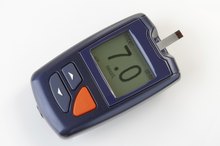High Insulin Foods
Produced in response to an increase in blood sugar, insulin is a hormone that allows glucose to enter cells and is used as energy, or stored in the liver, muscle or fat cells. High-glycemic carbohydrates like sugars and starches cause the body to produce higher levels of insulin. Sustained high levels of insulin in the body can result in cells becoming insulin resistant, which over time can contribute to obesity, stroke and diabetes.
Refined Grains
Foods such as white flour, white rice and degermed cornmeal made from refined grains have high glycemic values and increase insulin production. The process used to refine grains gives products a finer texture and longer shelf-life, but it also removes the dietary fiber that makes whole grains have a lower glycemic value. Foods like bread, couscous or pasta are all usually made from refined grains, or a mixture of whole and refined grains.
Sweetened Foods
Foods Containing Glucose or Fructose
Learn More
Foods naturally high in, or with added, sugar cause a rapid increase in insulin production. Products may list sugars under a number of different names, such as sucrose, maltose or dextrose, all of which contain glucose. When consumed, glucose raises blood sugar, which requires insulin to process. The amount of insulin produced directly relates to the level of blood sugar, so foods high in glucose can cause very high levels of insulin. Products high in sugars include beverages like soda and sports drinks. Many baked goods and snack foods like cookies, snack cakes and some breakfast cereals are made with both refined grains and added sugar which can cause massive spikes in insulin production.
Starchy Vegetables
Vegetable starch increases insulin because it is made up of chains of individual sugars. Resistant starches contain longer chains of sugars will take longer to digest than simple carbohydrates containing branching sugars. Potatoes, corn and parsnips are all examples of starchy vegetables that will cause a high insulin response. Sweet potatoes, carrots and beets are lower-glycemic starchy vegetables that can be used as an alternative to help avoid excessive insulin production.
Related Articles
References
Writer Bio
Colin Cash has been writing social commentary and fitness-related articles for websites and blogs since 2009. He is the CIO of a small government agency and a dedicated weightlifter with extensive study of nutrition, supplementation and training protocols. Cash attended California State University in San Bernardino and has an Associate of Science in administration of justice.








